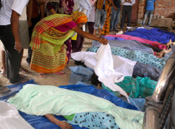
Signatories to the Accord on Fire and Building Safety in Bangladesh, which covers more than 1,000 garment factories, met a 15 May deadline to approve the standard proposed by the global unions IndustriALL and UNI, who had crafted the deal in alliance with labour rights groups the Clean Clothes Campaign and Worker Rights Consortium. The number of signatories has risen steadily since.
The Accord, which has been welcomed by the UN’s International Labour Organisation (ILO) and the OECD, came three weeks after the devastating collapse of the Rana Plaza building in Savar, outside Dhaka, Bangladesh. The eight storey building housed several garment factories.
By 16 May these companies had signed on: H&M, Inditex, C&A, PVH, Tchibo, Tesco, Marks & Spencer, Primark, El Corte Inglés, jbc, Mango, Carrefour, KiK, Helly Hansen, G-Star, Aldi, New Look, Mothercare, Loblaws, Sainsbury’s, Benetton, N Brown Group, Stockmann, WE Europe, Esprit, Rewe, Next, Lidl, Hess Natur, Switcher, Abercrombie & Fitch, John Lewis, Charles Vögele, V&D, Otto Group, s.Oliver and Bonmarche.
IndustriALL general secretary Jyrki Raina urged other retailers – notably absentees are Gap and Walmart – to follow this lead. “We will not close the door on brands who want to join the Accord after the deadline but we will be forging ahead with the implementation plan from today,” he said. “We are talking improving the working conditions and lives of some of the most exploited workers in the world, earning $38 a month in dangerous conditions.”
UNI general secretary Philip Jennings said: “We made it! This accord is a turning point. We are putting in place rules that mark the end of the race to the bottom in the global supply chain.” Commenting on the no-shows, he said: “Walmart, the world’s largest retailer, is out of step. By not signing up the Walmart brand sinks to a new low. Equally Gap’s refusal to join is a mistake that shoppers will not forget. We will make progress without them” [see: Walmart and Gap ‘run away’ from Accord].
The campaign has made other notable breakthroughs, with moves to raise the minimum wage in the Bangladesh garment industry and to ease rules on unionisation already advanced. The Accord also grants workers the right to refuse dangerous work, in line with ILO conventions.
Speaking after a follow-up emergency meeting of retail unions worldwide, convened by UNI to thrash out a route map to “a new world of retail” in the wake of the factory safety agreement, Philip Jennings said: “The race to the bottom stops here.”
Walmart and Gap ‘run away’ from Accord
As the number of retail companies signing up to the Bangladesh Fire and Building Safety Accord continues to grow, the garment workers of Bangladesh “have been given a slap in the face by Walmart and Gap,” the global unions that brokered the deal have said.
The retail giants have now produced a code of their own where they will act as judge and jury, warned IndustriALL and UNI. According to the union groups, “more than 40 global companies have shown their commitment to staying in Bangladesh and investing to improve factory safety in the Bangladeshi garment industry, under the Accord.
IndustriALL and UNI, along with their NGO partners, the Clean Clothes Campaign and the Worker Rights Consortium, deplore Walmart and Gap’s tactics.”
IndustriALL general secretary Jyrki Raina said: “The kind of voluntary initiative being put forward by Walmart and Gap has failed in the past and will again fail to protect Bangladeshi garment workers.” He added: “Walmart has cynically refused to pay compensation to the Tazreen factory fire victims and is now undermining the constructive efforts of other companies” (Hazards 121).
UNI general secretary Philip Jennings said: “Walmart and Gap are revisiting the errors of the past. They are out of step with the public mood. They are ignoring shoppers and letting down Bangladeshi garment workers.” He added: “Walmart and Gap are blind to the new retail reality that shoppers will not tolerate inhumane factory conditions. How high does the body count have to go for them to do the right thing?”
The Sum of Us call for Gap and Walmart to sign up.
Bangladesh
As rescue efforts drew to a close after a building collapse on 24 April 2013 that killed at least 1,127 Bangladeshi garment workers, over 30 of the world’s top retailers signed up to a groundbreaking safety deal brokered by global trade unions.
Further information
| • | IndustriALL |
| • | UNI |
| • | Clean Clothes Campaign |
| • | Worker Rights Consortium |
| • | ANROEV |
Photos Qamrul Anam/IndustriALL
Images
Click on images for larger versions
Hazards webpages
Working world • Deadly business
















